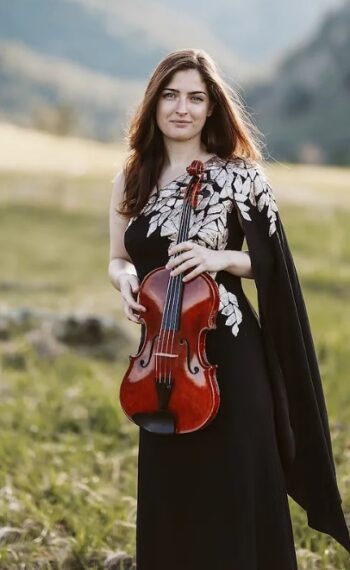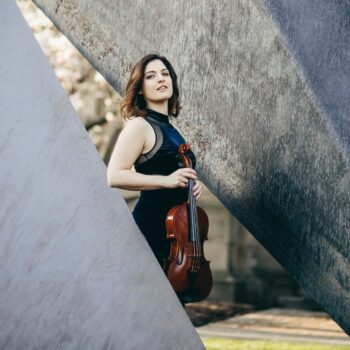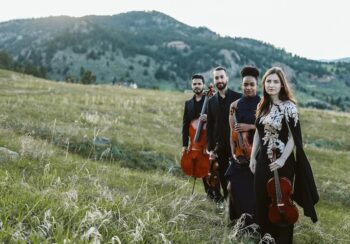Aimee McAnulty
Aimée McAnulty studied viola at PCM with Patrick Rosalez and chamber music with a number of PCM faculty, including Andrew Cook, Aimée Kreston, and Rebecca Merblum. She received her Bachelor in Music from the University of Michigan in 2019 and is the violist in the Ivalas Quartet. Ivalas Quartet has performed in various concert series and participated in residencies across the country (including University of Colorado Boulder under mentorship of the Takács Quartet). They were named Resident String Quartet at the Juilliard School, in the fall. Over winter break we caught up with Aimée. Read more below.

PCM: What is the most valuable thing you learned from studying music in high school?
AM: I found it incredibly empowering to play with other students in different ensembles. The range of ensembles that I joined in high school paved the way to figuring out how my instrument functions within certain parameters. Playing viola is always a balancing act in that way.
One of my fondest memories were weekly coaching sessions – it didn’t particularly matter with who. Every coaching session I figured out a little more about the kind of player I wanted to be as a violist, and what my favorite ensembles were to play in. I will say that I had the most fun playing Brahms in any form and still do today. Turned out well for me, having now been in a string quartet of my own for about four years!
PCM: After graduating high school, you received a Bachelor in Music from the University of Michigan. What are some highlights from your studies?
AM: There are exceptional professors all over the world, but I was particularly interested in University of Michigan’s music program because of its celebrated prestige and its variety of degree options. Fun fact: I originally wanted to pursue a dual degree with music education or neuroscience, but ended up not putting my viola down enough… so that’s where that ended.
U of M has seen a lot of changes since I graduated, but the level of playing there has never wavered. My favorite memories are when I either met, played for or shared the stage with a number of incredible musicians and furthermore, artist citizens. I met some of the most dedicated people at U of M.

PCM: You are now part of the Ivalas Quartet. Can you share more about the ensemble? How was it founded, and where/what kinds of music do you perform?
MA: Ivalas started at the University of Michigan in 2017 officially four musicians of color came together and decided to take action about the lack of representation of BIPOC musicians and composers in classical music. While a daunting task, what they initially started and what I’ve always loved about my quartet is that they put their hearts into what they already love doing. The point isn’t to scold or scorn the field over its obvious shortcomings…it’s more that we couldn’t sit back from the conversation of diversity, equity and inclusion.
For me, a large part of the conversation above started with my own identity as a white-passing Argentine- American and how I was going to use my privilege. When I was asked to join the
group, I immediately felt a sense of responsibility but admittedly didn’t know exactly what that part would look like.
We want to change the canon to represent the people who actually live in the world today and make music today. Our concerts will always feature and tie in a piece by a composer of color, and more importantly they will be featured multiple times in a season because we want their music to be heard more than once.
PCM: The Ivalas Quartet was in residence at University of Colorado-Boulder from 2019-2022 and, in the fall, was named Juilliard’s graduate resident string quartet. How did that come to be? How do you feel about this? What are you most looking forward to?
AM: I joined Ivalas in 2019 shortly before we started our residency with the Tákacs Quartet at CU Boulder. I was fortunate to study with Geraldine Walthers, as well as Richard O’Neill. Those were incredibly formative years as a young violist in a quartet. I adored my time in Colorado. We met so many more incredible musicians and people. One of our most exciting endeavors was our deep dive into community engagement performances with El Sistema Colorado, Friends of Chamber Music Denver, the Colorado Music Festival, as well as performances through the Tákacs Series and CU.
Juilliard is an incredible place. We worked really hard and are ecstatic to be here. We went through an audition process together as a quartet, much like we did for the program with the Tákacs Quartet. Tiani Butts, our second violinist, joined us in 2021 and we felt it would be an incredible experience to receive an education and live in one of the most amazing cities for music in the United States. We could not be more grateful for the amazing opportunity to study with the Juilliard Quartet. They are incredible mentors and people. Every conversation is completely inspiring. We are looking forward to a wonderfully packed semester with several projects, including a number of community engagement concerts at schools and facilities in NYC, our residency at Caramoor in upstate NY, and several concerts in Nashville, TN and Colorado. We are also looking forward to playing in Carnegie Hall at the end of the semester!

PCM: In addition to performing, the quartet seems dedicated to providing educational opportunities for local communities. Why is this important to you and the quartet’s other members? What do you hope to achieve in educating the next generation of musicians?
AM: Our mission is to show representation through our music. It all starts with how we present our craft and the most tangible and meaningful way we have found to do that is through connecting with young students and aspiring musicians and artists. We know that we can’t educate everyone, but we want to inspire as many people as possible. The dream is that every student we play for feels a sense of place, purpose and, in turn, begins to dream of what is possible with their art, whatever it may be. We want to inspire young people to dream big and, especially for those budding musicians out there, take their craft to the next level without feeling threatened or questioning their right to do so.
PCM: Is there anything else you would like to share with the PCM community?
AM: I had an incredible time reflecting on my time at PCM. It was brilliant in so many ways. I encourage parents, teachers and students to go to concerts, and see things you think may not be for you. Make friends and embrace the new, send those thank you messages to those who have an impact on you! I would not have found my passion for chamber music without the program at the Pasadena Conservatory of Music.



